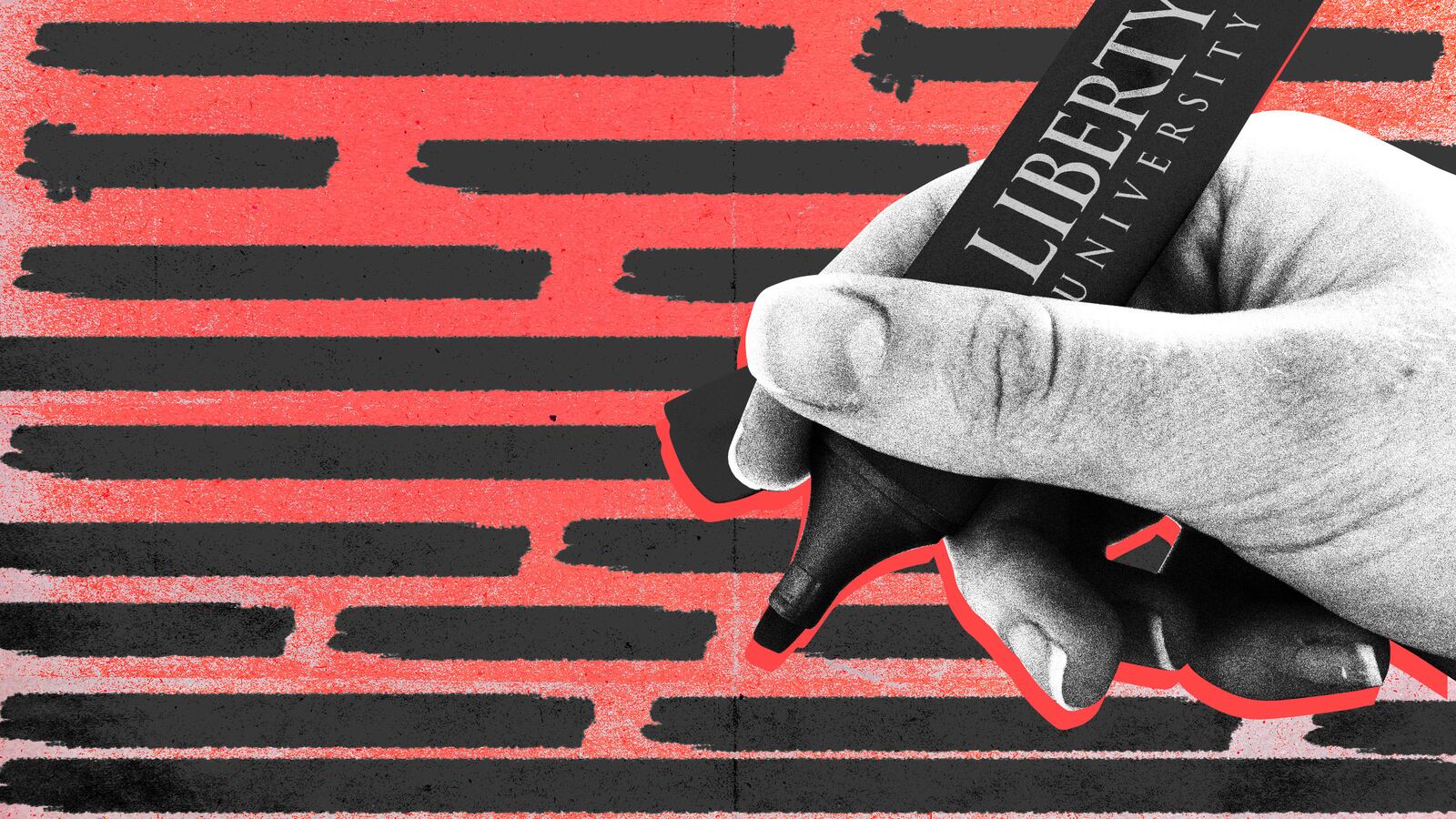For conservative commentators, liberal college campuses are a source of never-ending obsession. Countless hours of Fox News coverage focus on safe spaces, trigger warnings, or the latest example of “political correctness.”
But what about the few conservative campuses out there? Right-wingers spend so much time complaining about perceived campus craziness that you’d expect the few colleges they control to be beacons of free speech and campus freedom. But when you look at the most prominent Christian conservative college, Liberty University, it’s clear that this isn’t the case.
To campus administrators, “Liberty” isn’t just a name. University President Jerry Falwell Jr. never hesitates to espouse freedom-laced rhetoric, and touts Liberty as a shining alternative to what he dismisses as radical left-wing colleges across the country.
“At Liberty we believe firmly in academic freedom for our faculty and a commitment to the free and open exchange of ideas,” Falwell insists. “This is in stark contrast to many major universities, where students are often ridiculed in the classroom for expressing ideas that faculty deem to be politically incorrect and protests often result in speakers being disinvited from appearing because of their viewpoints.”
But this is all just a facade. Liberty doesn’t live up to its name.
On no issue is Liberty’s hypocrisy more obvious than freedom of speech. Time and time again, university administrators betray their stated values and embrace authoritarianism. In 2016, Falwell himself censored an anti-Trump column in Liberty’s student newspaper, preventing publication of criticism of the Access Hollywood tape where Trump made grotesque comments about grabbing women. This censorship came only a week after Falwell released a statement celebrating Liberty’s commitment to free expression.
Administrators evidently find no shame in espousing rhetoric about free speech while simultaneously silencing their critics on campus. In 2009, Liberty “derecognized” the school’s chapter of College Democrats because the national Democratic Party is pro-choice, and dares to “promote the LGBT agenda.”
When an anti-Trump Christian activist came to Liberty to pray with students, he was forcibly removed by police. The administration cited “safety” concerns, asserted their private property rights, and banned him from campus. Administrators might legally have the right to do this, and it also happens, to a lesser extent, at other private religious schools—but that doesn’t make Liberty’s hypocrisy any less heinous.
As it turns out, administrators at Liberty won’t even tolerate libertarians. A booth set up by Liberty students from Young Americans for Liberty (YAL) to discuss marijuana legalization was shut down by campus police, who didn’t want any drug-related content on display.
For all their talk about political correctness and free speech, Liberty administrators have essentially turned their campus into a safe space for the far right. In 2006, members of a gay rights advocacy groups were arrested when they stepped foot on Liberty’s campus. Falwell was unabashed in his explanation, saying that Liberty will not “permit them to espouse opinions or otherwise suggest beliefs... that are in opposition to the morals and values that this institution promotes.”
Whatever happened to “academic freedom” and “the free and open exchange of ideas?” Liberty administrators even removed chapters about human sexuality from their Psychology 101 textbook. This led to allegations that they were promoting a homophobic academic agenda, which Falwell vehemently denied. But look at Liberty’s nondiscrimination policy, and you’ll notice one notable omission from the list of protected classes—sexual orientation.
Still, the school’s website states that “At Liberty University, we believe in helping our students gain a greater understanding of themselves and their world. We believe this gives them the freedom to define themselves not only by what they do but by who they are.”
But the code of conduct Liberty students are expected to abide by is extremely restrictive. Students can even be punished for their private, intimate behavior—on or off campus. Engaging in pre-marital sex or same-sex relations can be grounds for expulsion in certain circumstances, and while this is sometimes the case at other Christian universities, Liberty enforces these policies more rigorously than most. This creates a culture of fear and retaliation on campus, where students are always worried that others might rat them out.
Does that sound like students have the “freedom to define themselves?”
It is true that Liberty may not technically be subject to the same constitutional scrutiny and anti-discrimination laws as public universities. The Foundation for Individual Rights in Education (FIRE), long considered the authority on campus free speech issues, concluded that colleges like Liberty “aren’t legally bound by the First Amendment like public colleges are”—but that doesn’t mean they should escape criticism for their hypocritical and censorious behavior.
Even as a private institution, Liberty students receive more than $772 million in federal funds. They receive so much in taxpayer-funded Pell Grants, veterans benefits, and subsidized loans that of all universities nationwide, Liberty ranks sixth for the most federal financial aid received. In fact, according to The New York Times, the majority of Liberty’s total revenue comes from the government—so at some point, it’s fair to question how much latitude to discriminate Liberty should be given.
Still, the story isn’t that simple. Liberty has clearly decided that some topics are off-limits, but they also routinely invite liberal speakers to campus. Just this year, the school invited former President Jimmy Carter to deliver the commencement speech, and students, while skeptical, didn’t protest or heckle the Democrat. The same was true during the 2016 election, when then-candidate Bernie Sanders came to Liberty’s campus. So at times, Liberty shines as an example of free expression and robust debate.
Yet Liberty’s not exactly inviting liberal-left intellectuals like Katha Pollitt or Paul Krugman to campus—and if they did, their students would probably give the Berkeley rioters who protested Milo Yiannopoulos a run for their money. After all, this is the same school that calls on the cops on gay rights activists and pot-friendly teenagers.
All this makes it fair to ask: Do students get what they signed up for?
It’s true that Liberty’s code of conduct spells out most of their restrictions, and students should be making an informed decision about where they enroll. But that ignores the reality that young people, especially ones from conservative, Christian families, are often pressured to attend certain colleges by their parents, especially when those parents are holding the purse strings.
Still, colleges campuses are where the next generation comes of age, and freedom of speech and expression are essential to that process. So even though Liberty is a private institution, we should be concerned that it is failing to live up to its name.
Brad Polumbo is a college student and writer for Young Voices. His work has appeared in the Boston Globe, The Federalist, Fox News, and National Review.





